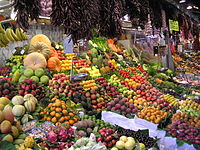- Marketplace
-
 Street markets such as this one in Rue Mouffetard, Paris are still common in France. Resellers and farmers sell fruits and vegetables, but also meat and fish, and other produce.
Street markets such as this one in Rue Mouffetard, Paris are still common in France. Resellers and farmers sell fruits and vegetables, but also meat and fish, and other produce.
A marketplace is the space, actual, virtual or metaphorical, in which a market operates. The term is also used in a trademark law context to denote the actual consumer environment, ie. the 'real world' in which products and services are provided and consumed.
Contents
Marketplaces and street markets
A marketplace is a location where goods and services are exchanged. The traditional market square is a city square where traders set up stalls and buyers browse the merchandise. This kind of market is very old, and countless such markets are still in operation around the whole world.
- In North America such markets fell out of favor, but renewed interest in local food has caused the reinvention of this type of market, called farmers' markets, in many towns and cities.
- In Europe, especially in France and Britain, street markets, as well as "marketplaces" (covered places where merchants have stalls, but not entire stores) are commonplace. Both resellers and producers sell their wares to the public.
- In Australia, the largest "open air" market is the Queen Victoria Market - at seven hectares (17 acres), in Melbourne, which is also the largest in the Southern Hemisphere.
- Markets are often temporary, with stalls only present for one or two days a week ("market days"), however some (such as Camden Market in London, UK) are open every day of the week. Such markets are normally specialist—the various stalls of Camden Market, along with the shops associated with it, sell a variety of alternative lifestyle products ranging from clothes and jewellery to CDs, instruments and furniture. An example of a large market is Chatuchak weekend market in Bangkok.
- Some large markets have become permanent institutions comparable to shopping malls. One example is the huge Seventh-Kilometer Market near Odessa, Ukraine.
The Roman term for market, still in use in a related sense, is forum. The modern shopping mall can be seen as an extension of this concept.
Wholesale markets
Wholesale marketing can take place at a market which primarily sells to traders such as caterers and small shopkeepers, rather than to members of the public, although members of the public are not necessarily excluded. London, England has several centuries old wholesale markets such as Smithfield Market and Billingsgate Fish Market.
Internet Marketplaces
The growing prevalence of Internet access has enabled new markets to emerge online. One example is eBay, a globally available auction house for products. The Internet has also allowed other marketplaces to thrive by connecting buyers and sellers from disparate locations. The formation of online marketplaces often occurs quickly in response to social or economic trends. Craigslist and Pricefalls, LLC are other websites that allow the public to trade goods and services. Internet marketplaces can further be categorized as B2B , B2C and C2C marketplaces.
See also
- Agricultural Marketing
- Bazaar
- Category:Market houses
- Fish market
- Flea market
- Marketspace
- Market square
- Market town
- Mercado
- Roman Forum
- Souq
- Street market
- Freelance marketplace
- Public exchange
External links
Categories:- Retail markets
Wikimedia Foundation. 2010.



